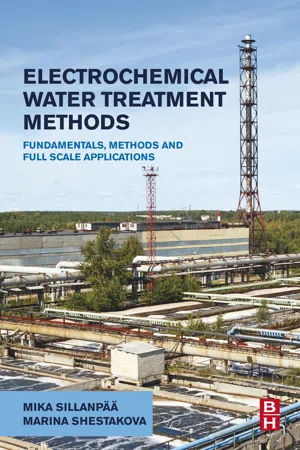
Electrochemical Water Treatment Methods
Fundamentals, Methods and Full Scale Applications
- 310 pages
- English
- ePUB (mobile friendly)
- Available on iOS & Android
Electrochemical Water Treatment Methods
Fundamentals, Methods and Full Scale Applications
About This Book
Electrochemical Methods for Water Treatment: Fundamentals, Methods and Full Scale Applications covers all traditional, emerging and combined methods currently available for the treatment of surface, drinkable water and industrial wastewater. Topics covered include an overview of pollutants and treatment methods, an extended introduction to electrochemical processes in water treatment, electrochemical oxidation (including electrodesinfection, electrochemical reduction, electrocoagulation, electroflotation, and electrodialysis. In addition, emerging and combined methods are presented, as is a discussion on the available equipment necessary to scale up the operation of all methods.
Electrochemical technologies have many common issues in terms of design, operation and performance. This book brings together a wealth of information on all different methods in a single source to provide broad insights and enable the connection between challenges and opportunities for different methods. The combination of technical information, design and case studies offered helps researchers better understand the challenges associated with scale up and implementation.
- Covers all electrochemical methods for water treatment
- Includes methods for the treatment of surface, drinking water and industrial wastewater
- Presents discussions on equipment in the context of scaling up the operation
Frequently asked questions
Information
Introduction
Abstract
Keywords
Nomenclature
| Latin alphabet | ||
| Q | Electric charge | C |
| I | Current | A |
| t | Time | s |
| m | Mass of the substance liberated or deposited at an electrode | |
| M | Molar mass of a substance | g/mol |
| F | Faraday constant | 96485.33289(59) C/mol |
| NA | Avogadro's number | 6.022141·1023 mol−1 |
| e | Elementary charge of an electron | 1.6021766·10−19 C |
| z | Number of electrons participating in reaction | |
| E | Cell potential at a given temperature | V |
| E0 | Standard cell potential | V |
| R | Universal gas constant | 8.314472 (15) J/K mol |
| T | Temperature | K |
| Qr | Reaction quotient | |
| K | Electrochemical equivalent of a substance | |
| Vs | Solution volume | dm3 |
| ΔCOD | COD decay | g/dm |
 | Standard reduction potential for the reduction half reaction occurring at the cathode | V |
 | Standard reduction potential for the oxidation half reaction occurring at the anode | V |
| ΔG | Change in the Gibbs energy | J/mol |
| W | Work by the galvanic cell for the chemical transformation of 1 mol of the reactant | J/mol |
| ΔH | Change in process enthalpy | J/mol |
| Table Continued | ||
| ΔS | Change in process entropy | J/K mol |
| γ | Activity coefficient | |
| a | Activity | mol/cm3 |
| ae/as | Ion activities in the near-electrode layer/the bulk solution, respectively | mol/cm3 |
| A | Electrode area | cm2 |
| j | Current density | A/cm2 |
| j0 | Ex... |
Table of contents
- Cover image
- Title page
- Table of Contents
- Copyright
- Chapter 1. Introduction
- Chapter 2. Electrochemical Water Treatment Methods
- Chapter 3. Emerging and Combined Electrochemical Methods
- Chapter 4. Equipment for Electrochemical Water Treatment
- Appendices
- Index
